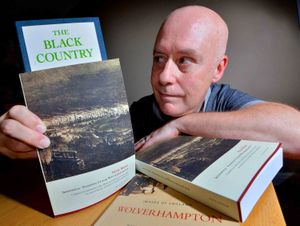Is Wolverhampton the true capital of the Black Country'?
Author Nick Moss challenges Dudley’s claim to the throne in a controversial new book.

How do you define the Black Country?
For years the officially accepted definition, put forward by the Black Country Society, has claimed the region is defined 'solely' by the existence of the thick coal seam running beneath its surface.
And Dudley is widely accepted to be the Black Country's capital, chiefly down to its location at the region's heart.
But now a controversial new book is likely to prompt a few differences of opinion in Black Country boozers – by claiming that Wolverhampton should be regarded as the region's true capital.
Author Nick Moss spent four years scrutinising newspaper archives and books dating back to the 1800s for his new book, Ironopolis – Standing Up for Wolverhampton.
He believes his work is the first attempt to categorically define where the original Black Country lay and readily admits: "I'm sure the findings may surprise a few people."
No Dudley?
Dropping his first bombshell, Mr Moss claims that Dudley wasn't even part of the original Black Country.
"The Black Country initially only comprised the South Staffordshire section, running from Wolverhampton, through to Bilston, Darlaston, Coseley, Tipton, Wednesbury, and West Bromwich," the author said.
"This didn't feature the Worcestershire section, including the town of Dudley, and part of Lye and Halesowen.
"It was not in 1850 that the Worcestershire section was incorporated."
The first use of the term 'Black Country' stems from the Lichfield Mercury in 1841, when the clerk of Lichfield attended a meeting of Liberal Reformers at the Guildhall.
In paying respect to the 'valuable working-classes of the country', he said: "Who could go into the black country in Staffordshire... Wolverhampton, Bilston, Tipton."
Thick coal seam
Mr Moss, from Bilbrook, Wolverhampton, says the evidence he unearthed 'fundamentally contradicts' the Black Country Society's definition of what constitutes the Black Country.
"This definition dates back to the 1960s and is solely based on the presence of the thick coal seam," he says.
"This largely takes Wolverhampton out of the equation, as it was regarded more for the thin seam and its much sought after iron ore.
"It appears that much of the thick coal seam was too crystalline in nature to be used for industrial purposes in the iron works, and was mainly for domestic use."
Mr Moss cites famed geologist Joseph Beete Jukes, who said the iron-ore tract of the coalfield, lying next to the thin seam and notably rich in the Wolverhampton coalfield, was what truly defined the Black Country.
And according to official parish records from 1841, Wolverhampton had more miners than any parish in the entire Black Country, with the exception of Bilston.
Hills of black rubbish
"The under-valued 'thin seam' tract of land between Wolverhampton, Bilston, and Willenhall was often noted as the most damaged, described as 'mile upon mile of hills of black rubbish, masking the whole face of nature'," Mr Moss continued.
"And east Wolverhampton and Bilston was the district most often noted to have the worst smog due to the concentrations of iron works and furnaces.
"I'm challenging this definition and want to see it changed.
"It is very clear that the original Black Country was considered to be based on those areas of South Staffordshire where both the shallow thin and thick coal seams lay, where the critical iron-ore lay, and also by those adjoining districts where the great iron works lay.
"It was clearly considered to be defined by both coal and iron, by both the coal in the ground and the smog created by the iron works. Put simply it was never defined by coal or iron alone."
Mr Moss concedes that viewing Dudley as the capital of the Black Country is 'understandable' as its sits in the centre of the region.
"But you cannot change history," he says.
"And right through the 1800s to the 1930s, Wolverhampton was widely considered its capital or metropolis, possibly because Dudley sat in this Worcestershire enclave, and hence could not be considered capital of a region that primarily lay in an adjoining county.
"County status was important to people back then."
Ironopolis – Standing Up for Wolverhampton is available from Amazon. Hard copies are £17.70 and it's £8.49 for the e-version.





